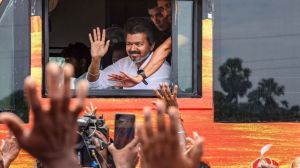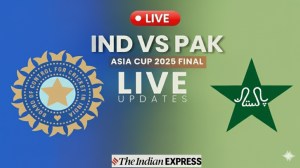Anatomy of indecision
The politics of the nuclear deal has everyone saying everything at the same time

What was expected to be a “make-or-break” meeting of the UPA-Left coordination committee on the India-US civil nuclear cooperation deal turned out to be an anti-climax. The meeting took place amidst plausible reports that Prime Minister Manmohan Singh was firm on pushing the deal through without further delay. This was understandable because, as US officials constantly remind this country, “time is running out”. Nor could the prime minister possibly go to the G-8 summit in Japan in early July with the deal’s fate still hanging in the balance because of domestic discord.
The meeting itself was stormy, and neither side budged an inch from its position. Yet a compromise of sorts was reached, as was to be expected in view of the perfervid political activity that had gone on earlier between the Congress and its UPA allies, and within the Congress itself. Two heavyweight allies — Union Agriculture Minister Sharad Pawar and Tamil Nadu Chief Minister M. Karunanidhi — set themselves up as “mediators” between the Congress and the CPM-led Left Front, though to no avail. Equally fruitless were the efforts of Congress leaders running around like chickens with their heads cut off, if this phrase is permissible.
Even so, almost everybody takes it for granted that a parting of the ways between the Congress and the communists is inevitable, perhaps sooner rather than later. This itself could cause fresh trouble because, according to Foreign Minister Pranab Mukherjee’s announcement, the coordination committee, to meet in “due course”, has to formulate its “findings”, which would surely need time. The government might prefer a decision before the G-8 summit.
Soon after UPA parleys began, it became crystal clear that no one wanted early elections that could be precipitated by the withdrawal of the Left Front’s support should the government go ahead with the deal or even go to Vienna to sign the India-specific safeguards agreement with the International Atomic Energy Agency. Ironically, the difference between “advanced elections” and the poll on schedule is just four months. But the trouble is that inflation rising to the frightening double-digit figure of 11.05 per cent has sent shivers down the spines of politicians of all hues.
That is where the characteristic double-speak and hypocrisy of Indian politics came in. Congress spokespersons declared emphatically that Congress President Sonia Gandhi as well as the entire Congress party were “squarely for the deal and behind the prime minister”, while senior leaders got busy privately to persuade the good doctor that it would be better to wait until the party could be sure of receiving the support of Samajwadi Party leader Mulayam Singh Yadav. The 39 votes he commands in the Lok Sabha could be vital to bail out the UPA government. The tack of the allied leaders was different: “We are for the deal, but we also want to carry the Left with us”, a classic case of wanting to have one’s cake and eat it too. No wonder some are commenting that the prime minister has been “let down”.
During the last four years, the Congress leadership has treated the Samajwadi leader and his Man Friday, Amar Singh, with disdain. But the duo has its own reason to cosy up with the Union government. For, they are under virulent attack by the formidable chief minister of UP, Mayawati, who has remarkably withdrawn support from the UPA already. On the other hand, Yadav is under intense pressure from his old-time leftist allies. He is also a member of the so-called third front, somewhat unoriginally named United National Progressive Alliance. It is meeting in Hyderabad on July 3, and some of its leading lights are talking of a “collective decision” on the nuclear deal. What exactly the SP leader will do no one can foretell. But even if he does walk into the Congress’s parlour, is there a guarantee that he would not prove to be as slippery as other allies have?
This brings me to my main point: that this kind of indecision and dithering, double-speak and double-dealing is built into the situation, and these grievous flaws would persist and perhaps grow worse. In all fairness, there was a lot of indecision in Indian governance even during the era of single-party dominance. Indeed, the last Congress prime minister, P.V. Narasimha Rao, had propounded the doctrine that to not take a decision was a decision in itself. But it would be futile to deny that all the past ills have escalated since the dawn of the coalition age, at one time much welcomed.
Sadly, “compulsions of coalition”, routinely invoked since V.P. Singh’s short tenure of 11 months as prime minister, have become a convenient excuse for procrastination, prevarication, passing the buck and even perverse enactment of instant laws such as the one that Union Health Minister Anbumani Ramadoss needed for his vendetta against the eminent cardiac surgeon, P. Venugopal. (Subsequently declared invalid by the Supreme Court.)
The kind of troubles the coalition headed by Atal Bihari Vajpayee used to have has become much worse in the case of the UPA for a reason unique to it. In 2004, when Sonia Gandhi forsook the office of prime minister and chose Manmohan Singh for the post, her decision was widely applauded. It was then generally assumed that she would concentrate on the acutely pressing task of rebuilding the Congress and leave the prime minister free to run the government. Unfortunately, this has not happened.
Doubtless, the Congress president always shows the prime minister all due respect. But power resides at 10 Janpath, not at 7 Race Course Road, and this has ramifications down the line. In particular, there is little synergy between the Congress president’s establishment and the Prime Minister’s Office, better known as PMO.
One final point: idiocy is not a monopoly of any single party. The deplorably communal twist that a Marxist leader, M.K. Pandhe, has given to the nuclear deal for the benefit of Mulayam Singh Yadav has boomeranged on the CPM. Prakash Karat’s damage-limitation attempts have cut no ice. The communists are now being tarred with the communal brush.
The writer is a political commentator
indermalhotra30@hotmail.com





- 01
- 02
- 03
- 04
- 05


























